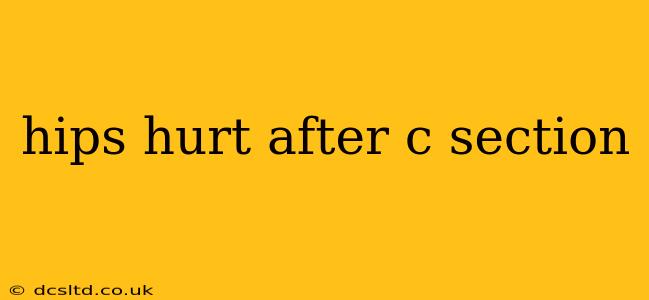Having a c-section is a major surgical procedure, and while it brings the joy of a new baby, it often comes with its share of postpartum discomfort. Many women experience hip pain after a c-section, and it's a concern that shouldn't be ignored. This comprehensive guide will explore the reasons behind this pain, offer potential solutions, and help you understand when to seek professional medical advice.
Why Do My Hips Hurt After a C-Section?
Post-c-section hip pain isn't always straightforward. Several factors contribute, and understanding them is the first step towards finding relief.
-
Hormonal Changes: Pregnancy significantly alters hormone levels. Relaxin, a hormone that loosens ligaments and joints in preparation for childbirth, can persist postpartum, making joints, including the hips, more susceptible to pain and instability.
-
Muscle Weakness: The abdominal muscles are weakened after surgery and pregnancy, impacting posture and core stability. This can lead to compensatory strain on the hips and lower back, causing pain.
-
Surgical Positioning: The position during the c-section itself can strain the hip joints. The prolonged immobility after surgery can also contribute to muscle stiffness and pain.
-
Scar Tissue: The incision site can cause adhesions (scar tissue) that can restrict movement and cause referred pain in the hips and surrounding areas. These adhesions can develop over time.
-
Posture Changes: Postpartum, women often adapt their posture to compensate for abdominal discomfort, placing extra stress on the hips.
-
Lack of Movement: Fear of pain or discomfort can lead to reduced activity, contributing to muscle stiffness and weakness, worsening hip pain.
How Long Does Hip Pain After a C-Section Last?
The duration of hip pain after a c-section varies greatly from woman to woman. For some, it might subside within a few weeks, while others experience pain for several months. Several factors influence the duration:
- Individual healing rates: Every body heals differently.
- Severity of the initial pain: More intense initial pain may indicate a more prolonged recovery.
- Adherence to recovery recommendations: Following your doctor's advice and engaging in appropriate physical therapy plays a critical role.
- Pre-existing conditions: Any existing musculoskeletal issues might prolong recovery time.
What Can I Do to Relieve Hip Pain After a C-Section?
Managing hip pain after a c-section often involves a multi-pronged approach:
-
Gentle Movement and Exercise: Light exercises, specifically designed for postpartum recovery, can strengthen weakened muscles and improve joint mobility. Consult a physical therapist for personalized exercises. Avoid strenuous activity until cleared by your doctor.
-
Pain Relief Medication: Over-the-counter pain relievers like ibuprofen or acetaminophen can provide temporary relief. Always consult your doctor before taking any medication, especially while breastfeeding.
-
Heat and Ice Therapy: Applying heat or ice packs can ease pain and inflammation. Experiment to see which works better for you.
-
Posture Correction: Maintaining good posture can reduce strain on your hips. Consider using pillows for support when sitting or lying down.
-
Rest and Relaxation: Adequate rest is crucial for healing. Prioritize sleep and minimize strenuous activities.
Is Hip Pain After a C-Section Normal?
While some degree of discomfort is expected after a c-section, persistent or severe hip pain should not be dismissed as "normal." It's crucial to communicate with your healthcare provider about your symptoms.
When Should I See a Doctor About My Hip Pain After a C-Section?
You should seek medical attention if:
- The pain is severe or worsening.
- The pain radiates down your leg.
- You experience numbness or tingling in your leg or hip.
- You have difficulty walking or bearing weight.
- You experience fever or other signs of infection.
Can Physical Therapy Help with Hip Pain After a C-Section?
Yes, physical therapy can be very beneficial. A physical therapist can assess your individual needs and create a customized exercise program to strengthen your core muscles, improve hip mobility, and alleviate pain. They can also teach you proper posture and techniques to prevent future problems.
This information is for educational purposes only and does not constitute medical advice. Always consult with your healthcare provider for any concerns regarding your health or treatment. They can provide the best advice tailored to your specific situation and medical history.
